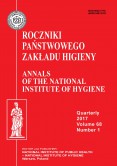Rocz Panstw Zakl Hig 2019, 70(4): 325-336
Significance of low-carbohydrate diets and fasting in patients with cancer
[Significance of low-carbohydrate diets and fasting in patients with cancer]
ABSTRACT
The differences between the metabolism and the physiology of cancer cells and the cells of the human body are assessed and used in most anticancer treatments. These differences encompass, among others, increased glucose metabolism in the changed cells. The aim of the paper was to discuss the results of studies concerning the relationship between lowcarbohydrate diets and fasting and the course of cancer. An inappropriately composed diet consisting of high amounts of simple sugars supplies cancer cells with nutrients, which may impair the effectiveness of cancer patients treatment. Lowcarbohydrate diets may, therefore, constitute an element of supplementary therapy in cancer treatment. The mechanism of low-carbohydrate diets in combination with standard treatment has not been completely explained, though. In initial studies it was proven that patients who were able to continue low-carbohydrate diets showed improvement in health and reduction of tumor mass or its slower growth. Moreover, it was observed that the inability of cancer cells to adapt in new environmental conditions that occur while fasting may have toxic effect on them. Introduction of fasting may sensitize cancer cells to chemotherapy, decrease concentration of growth factors and lead to repair of normal cells. On the other hand, fasting may also promote autophagy and, as can be concluded from the literature, its mechanism may have twofold activity: as a process impacting the survival or death of cancer cells.
STRESZCZENIE
W większości terapii przeciwnowotworowych oceniane i wykorzystywane są różnice między metabolizmem i fizjologią komórek nowotworowych, a komórkami ciała człowieka. Różnice te obejmują między innymi nasilony metabolizm glukozy w zmienionych komórkach. Celem pracy było omówienie wyników badań na temat związku diet niskowęglowodanowych i głodówek z przebiegiem choroby nowotworowej. Nieodpowiednio skomponowana dieta składająca się ze znacznej ilości cukrów prostych dostarcza składniki odżywcze komórkom nowotworowym, co może pogarszać skuteczność leczenia pacjentów onkologicznych. Diety niskowęglowodanowe mogą więc stanowić element terapii uzupełniającej w chorobie nowotworowej. Mechanizm działania diet niskowęglowodanowych w połączeniu ze standardowym leczeniem nie został jednak w pełni wyjaśniony. We wstępnych badaniach wykazano, że pacjenci, którzy byli w stanie kontynuować diety niskowęglowodanowe wykazywali poprawę stanu zdrowia, zmniejszenie masy guza lub jego spowolniony wzrost. Ponadto zaobserwowano, że niezdolność komórek nowotworowych do adaptacji w nowych warunkach środowiska, jakie występują podczas głodzenia, może działać na nie toksycznie. Wprowadzenie postu może uwrażliwić komórki nowotworowe na chemioterapię, zmniejszać stężenie czynników wzrostu i prowadzić do naprawy prawidłowych komórek. Z drugiej strony post może również promować proces autofagii, a jak wynika z piśmiennictwa, jej mechanizm może mieć działanie dwukierunkowe: jako proces wpływający na przeżycie lub śmierć komórek nowotworowych.
Liczba pobrań: 15173


